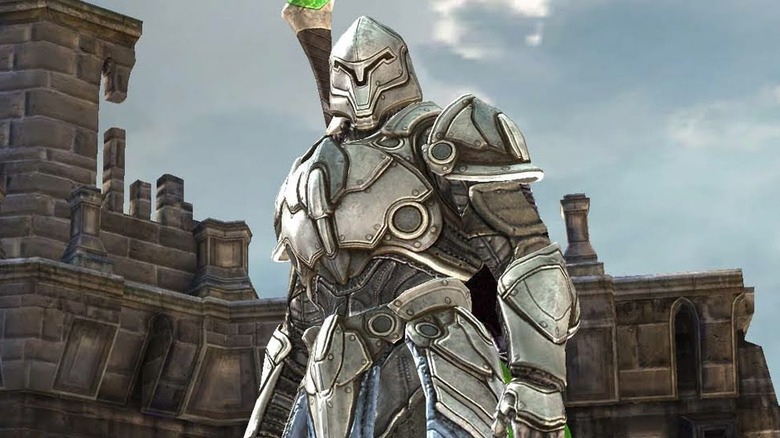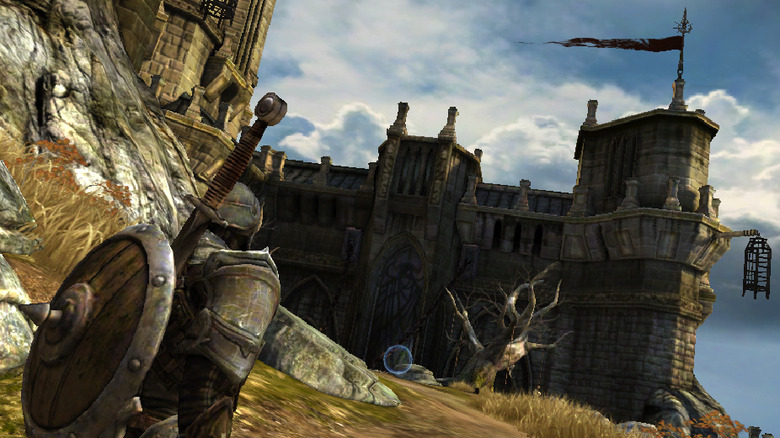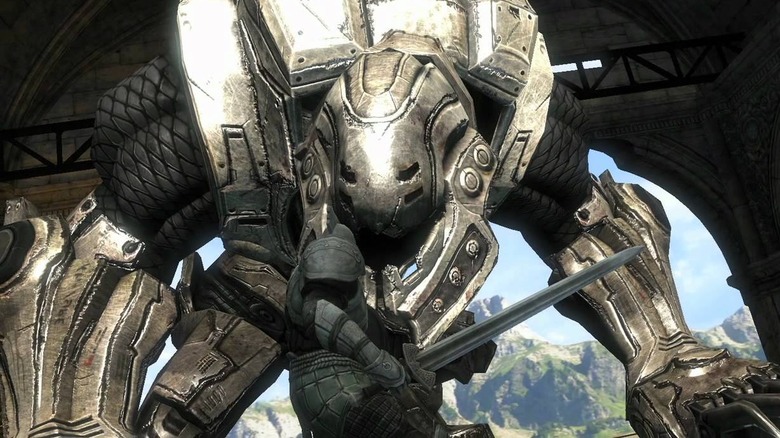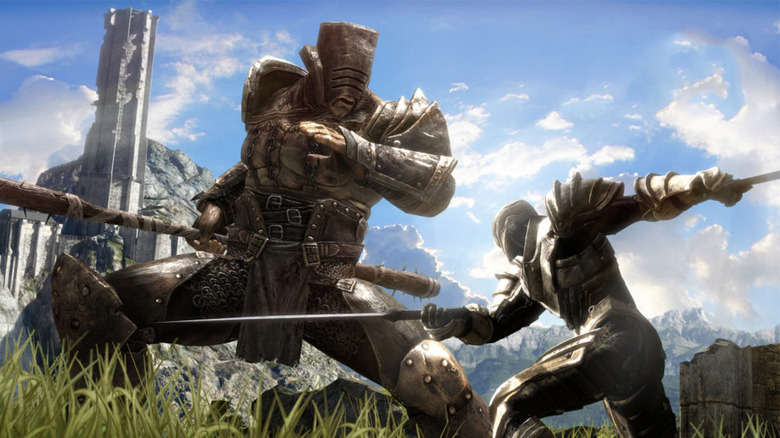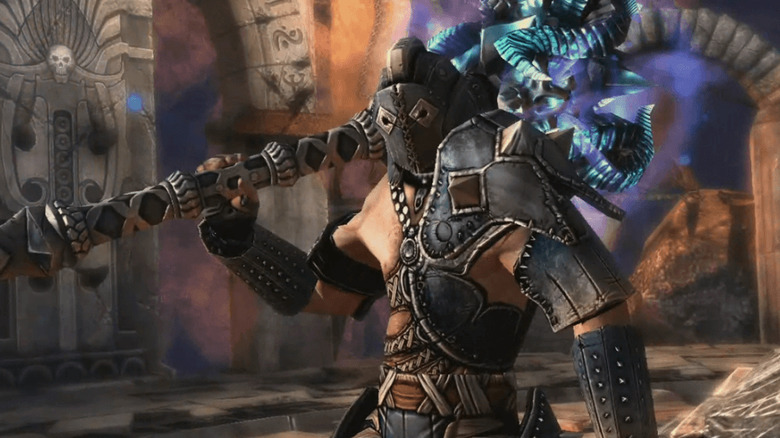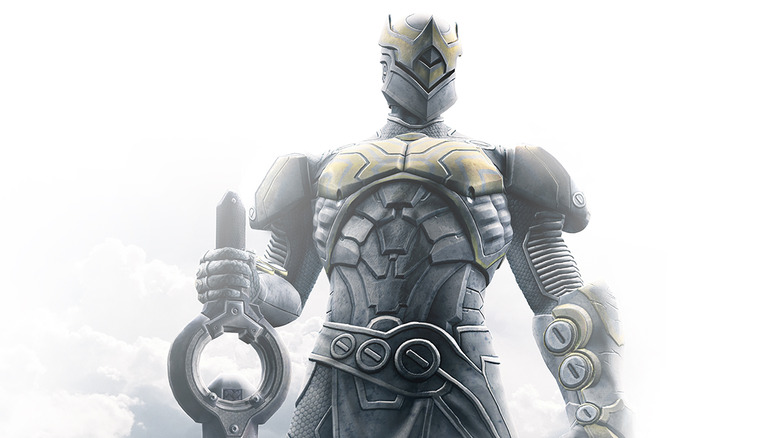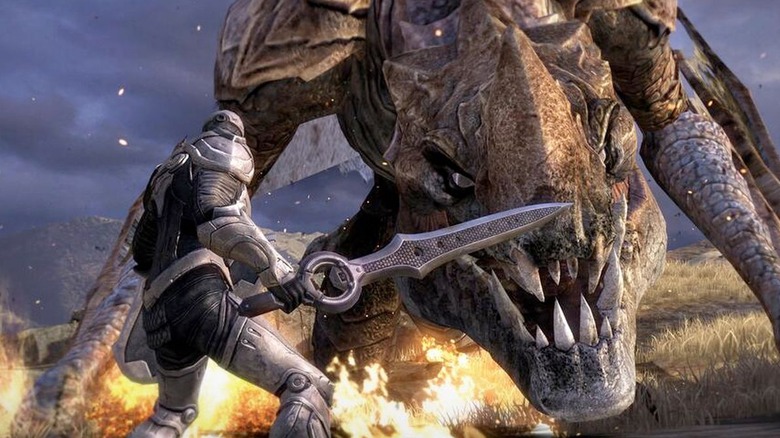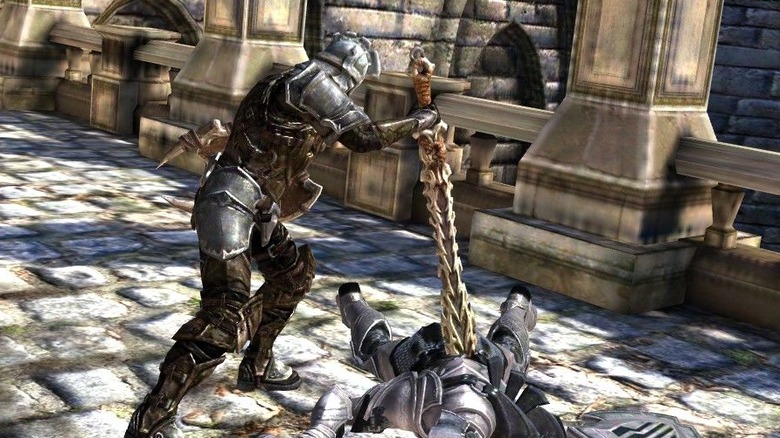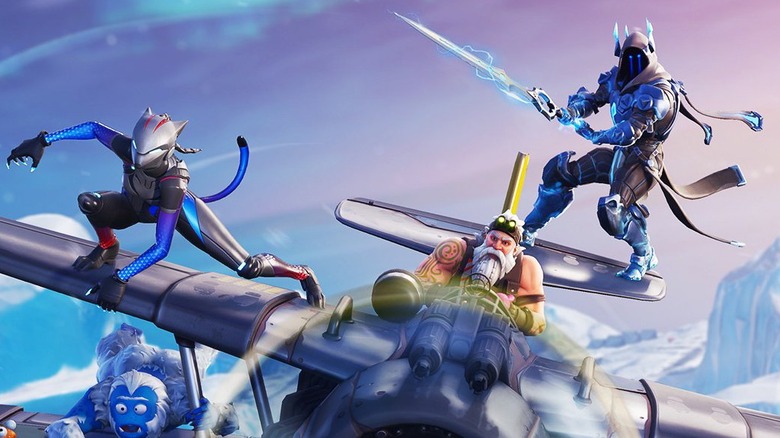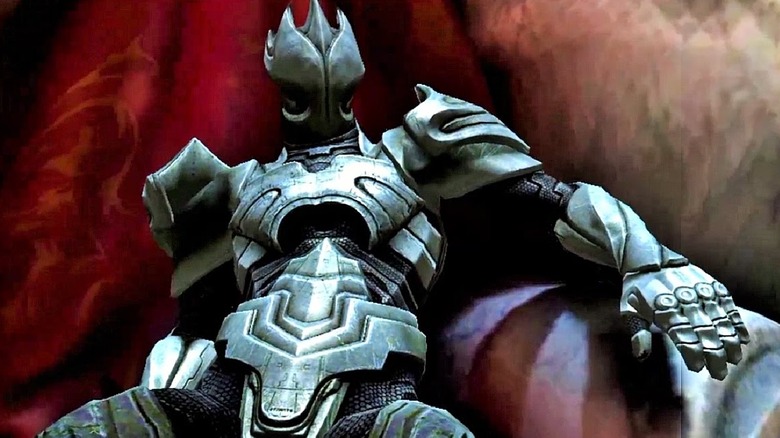Why We'll Never Get An Infinity Blade 4
Before they conquered the landscape of battle royale gaming with Fortnite, Epic Games brought the Infinity Blade saga to mobile. The sword and sorcery combat series from the development team at Chair Entertainment was a revelation, skillfully combining the repetition of rhythm games with character design and architecture more commonly suited to games like the Xenoblade or Devil May Cry series. Through a series of swipes on an iPhone or iPad, players could string together different combos and blocking moves, slicing their way to victory against larger-than-life enemies.
Infinity Blade's accessible gameplay mixed with the title's steep difficulty in ways that encouraged an amount of grinding and leveling up that was normally reserved for RPGs on consoles and PCs. Like with any proven hit, it became a franchise, with sequels and spinoffs and updates, oh my! However, since the release of Infinity Blade 3's final update in 2014, there has been little to no sign of the franchise continuing in any form. In fact, it's becoming more and more clear that Infinity Blade is done for good. Let's take a look at the rise and fall of the Infinity Blade series and take a stab at figuring out the reasons why we will likely never see the release of an Infinity Blade 4.
The revolutionary first game
The first Infinity Blade game was released in December of 2010. Following the bare-bones story of a hero (later named Siris) whom players usher through a cycle of death and rebirth in a never-ending battle against evil, Infinity Blade was a milestone in mobile gaming for a number of reasons. It was the first-ever iOS game to utilize the Unreal 3 Engine, which meant that it looked and played like a AAA title, even on a small phone screen. Not only that, but Infinity Blade was a massive financial success for Epic Games. It was the fastest-grossing app in iOS history. At a cost of $5.99 for the game, Infinity Blade raked in over $1.6 million within its first four days of availability.
As noted by Gamasutra, Infinity Blade continued to add updates after release, featuring new enemies and new branching pathways to explore. In addition, Epic marked the game's price 50% off when the first update arrived, putting the game back on top of the mobile app charts. As mentioned by Donald Mustard of Chair Entertainment in the Gamasutra interview, the world of mobile gaming was still very much an emerging market, so the free content updates were a brilliant way to get the word out and encourage people to buy a game that was continuing to evolve.
And evolve it did, as Infinity Blade was only the first release in what would quickly become a growing fantasy world with its own lore.
The universe gets bigger
The natural inclination with any sequel to a successful first entry is to double down on the things that worked the first time around, but to deliver them in a bigger and better experience than was previously possible. Chair took that ethos to heart in designing Infinity Blade 2, a sequel that upped the ante in just about every way. Infinity Blade 2 received stellar reviews, with IGN calling it "a near-flawless combination of best-of-breed visuals and touch-controlled gameplay."
Infinity Blade 2 featured a map that was much more complex than the first game, meaning that the repetition required to level up your character never quite felt like the same old thing, again and again. Magical combat was added in enemy fights, loot was more plentiful, and the game was a visual step up from the already-impressive first installment.
In addition to the impressive second game, the Infinity Blade universe expanded with a series of novels. Written by superstar fantasy author Brandon Sanderson, these books bridged the gaps between games and expanded the lore of the central character and his world. Between 2011 to 2013, two novels were released, Infinity Blade: Awakening, which took place between the first and second games, and Infinity Blade: Redemption, which set up plot threads for the third entry.
Despite all of this success and world-building, however, things were not all bright and shiny for the budding franchise.
Problems with availability
As is normally the case when there's a lack of availability for something with growing popularity, bootlegs were inevitably made and released. Back in 2011, a fake version of Infinity Blade 2 was released for free on the Google Play Store. Unfortunately, the supposed Infinity Blade 2 game file turned out to be "a gigabyte of junk." Epic responded swiftly and the bootleg IB2 was removed from sale.
By the middle of 2012, Epic Games considered the Infinity Blade series to be their most profitable franchise to date, "in terms of man years invested versus revenue." Despite the universal acclaim for the first two games, there were definite issues when it came to being able to actually play them. Namely, while Epic brought other releases, like the Unreal Engine 3 tech demo Epic Citadel, to the Android store, the Infinity Blade series remained exclusively on iOS platforms. It's not surprising, then, that some unscrupulous characters had resorted to trying to use the exciting name of the series to try to scam hopeful Android gamers. Despite the quick response from Epic, the fake game and continued lack of availability no doubt negatively impacted the brand in some ways.
Infinity Blade: Dungeons gets the axe
Developed by Impossible Studios, owned at the time by Epic Games, Infinity Blade: Dungeons was a prequel spin-off of the main series. The story of the game was supposedly set "several thousand years" before the events of the first game. This one took on more of a dungeon crawling style of gameplay than previous installments, with the controls taking the form of classic joystick buttons on the screen, mixed with the kind of finger-swiping combat mechanics that fans were familiar with.
Early reactions to the game were positive, but Dungeons' future came into question when Epic Games announced the closure of Impossible Studios. Epic Games founder Tim Sweeney explained in their announcement that their whole situation with Impossible Studios "wasn't working out," along with the fact that Dungeons was "now on hold."
Shortly thereafter, the game was officially canceled. So what exactly happened? It's hard to tell, but between all of the vagueness of the Impossible Studios closure announcement and the fact that early impressions of the game suggested that it would be a worthy addition to the series, it certainly seems more like Epic's interest in the franchise was beginning to wane. At the very least, the lack of comment on the cancellation of Dungeons wasn't a particularly great look.
Infinity Blade 3 chases trends
A few months after the cancellation of Infinity Blade: Dungeons, a proper third entry in the series was released, naturally titled Infinity Blade 3. The release was accompanied by the previously mentioned e-book, Infinity Blade: Redemption, and an animated short film, Infinity Blade: Origins, which recapped much of the growing mythology of the series. Infinity Blade 3 seemed poised to be another exceptional entry to the series.
The game received quite a few decent reviews. However, Infinity Blade 3 saw a fair amount of criticism for some of the changes implemented in this installment, some of which seemed to be chasing more recent mobile gaming trends. In their mostly positive review, Eurogamer complained of the installment's new loot systems and in-game transactions, saying, "Infinity Blade 3 feels awkwardly adrift between the hard-earned progression of a traditional RPG and the 'have it all now for a price' mentality of freemium, actively undermining itself at the player's whim." Eurogamer concluded that Infinity Blade 3 "feels like a game that exists more to serve a publishing agenda than an essential closing chapter in a coherent trilogy."
Infinity Blade 3 was still a well-liked game, but the new currency system and ability to essentially pay-to-win came across, as said by TouchArcade in their review, "like the best way to just break the game and take all the fun out of it." In other words, the series had begun embracing some of the worst aspects of mobile gaming.
The final updates for Infinity Blade 3
In summer of 2014, Chair announced that their next content update for Infinity Blade 3, Kingdom Come, would bring the series to a close. In the announcement post, Chair said, "All good things must come to an end, even the Infinity Blade trilogy." A few weeks later, Kingdom Come arrived on the App Store as a free update, while the base game's price was reduced. Kingdom Come featured a final showdown with the dragon king, Dragoor, ending the trilogy on a spectacularly large boss battle.
Chair's creative director, Donald Mustard, referred to the completed game as "the culmination of everything [Chair] hoped to achieve with the series." He also noted that he believed Kingdom Come to be "an exciting, meaningful conclusion to the trilogy." Even with all of that enthusiasm from the team behind the game, Kingdom Come's big, final boss battle with Dragoor was noted as being "almost identical" to the previous dragon battles from Infinity Blade 3. One wonders if the well of ideas was simply running dry.
The Infinity Blade series is pulled from sale
In December of 2018, the final nail was seemingly driven into Siris' coffin, as the entire Infinity Blade series was pulled from the App Store. Epic Games released a statement in regards to the removal of Infinity Blade: "At Epic we strive to put players first and to provide a supported, full-fledged experience in every game we publish. With the development of Spyjinx and other projects, it has become increasingly difficult for our team to support the Infinity Blade series at a level that meets our standards."
While it's commendable that Epic didn't want to give their customers a half-heartedly supported experience, it was also surprising that the games were pulled without much warning. All three installments were removed from the App Store on the same day as the announcement post.
However, there certainly was a precedent for this move. As pointed out by The Verge, Epic had previously ended Paragon in favor of focusing on Fortnite's continued success and had likewise canceled a new Unreal Tournament game for similar reasons. The Verge also mentions, "It certainly makes sense to discontinue support for a game that was likely already purchased and played by pretty much every potential buyer out there."
The Infinity Blade comes to Fortnite
Just a few short days after the Infinity Blade series' removal from the App Store, Epic Games announced that the titular Blade's legacy would live on in another game. Sure enough, the Infinity Blade was added as a weapon in Fortnite, with the Blade spawning once per match in Battle Royale.
While this initially seemed like a really fun gimmick, the addition of the Infinity Blade quickly backfired on Epic, with many players complaining about balance issues, due to the weapon's immense power. Simply put, the Infinity Blade was more or less the Golden Snitch of Fortnite: as soon as someone grabbed it, the game was all over for the rest of the players on the field. Due to the negative feedback, Epic pulled the Infinity Blade from the game. Well, almost. For a few days afterward, the Blade was still spawning in random matches, almost as if it refused to die. It finally disappeared after a further patch from Epic.
The Infinity Blade briefly returned to Fortnite in early 2019 as part of a Limited Time Mode called "Sword Fight." In this aptly-named mode, players could scramble to pick up randomly dropped bladed weapons, with the possibility of multiple Infinity Blades being wielded at once by different players. Since that event ended, however, the controversial Infinity Blade has yet to make another appearance.
An artifact of another time
Infinity Blade 4 likely won't ever happen because the series itself is part of a bygone era of gaming. For one thing, the fact that Android users never had a chance to play the game severely limited the scope of its fanbase. In an interview with Game Analytics, Ric Cowley of PocketGamer explained that one of the main appeals of mobile gaming "is that it's accessible to everyone — everyone has a smartphone." IB missed a huge section of the market.
Not only that, but with the Infinity Blade series getting progressively more complex with each installment, it doesn't really fall into the kind of casual feel that many mobile game customers are looking for. As Cowley explains, with mobile gaming, "You can just play something in three minutes and feel that fun factor as much as anything else."
It may simply be more fruitful in general for Epic to continue focusing on cross-platform integration. As noted by AppLovin, "Fortnite ... proved that technology had finally advanced to the point where the mobile gaming experience between console/PC and mobile was seamless, and the rewards for developers were enormous." Infinity Blade's limited platforms were the biggest knock against it. Fortnite is simply a bigger money maker and Epic seems pretty dead-set on continuing to add new content to that proven hit. At the end of the day, a revival of Infinity Blade probably no longer seems like a worthy investment in the eyes of Epic Games.

